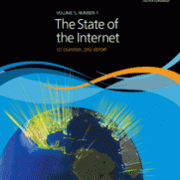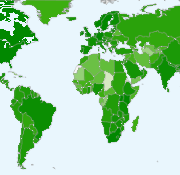Hong Kong in Honduras
Dr. Paul Romer, economist professor at New York University, is in talks with the Honduras government to establish “new reform zones,” designed to attract foreign investors. The “charter cities” would be about 1000 square kilometers in size, and be run by foreign developers with their own laws, leasing the land from the Honduras government.
I corresponded with Dr. Romer about the role of broadband technology in charter cities, particularly in Honduras. His responses to my questions are listed below. Additionally, Dr. Romer’s presentation at TEDGlobal2009 can be seen here, and an update on the progress in Honduras from TED2011 is located here.
President Lobo of Honduras supports the “cuidad modelo” concept, and endorsed it to government officials. Last month, the President announced that Trujillo would be the first charter city, with investors from South Korea, Canada, and England, as well as support from the Inter-American Development Bank.
The importance of terrestrial fiber cables for broadband connectivity to charter cities will probably be essential to their economic success. Additionally, if the cities are to slowly be incorporated into the rest of Honduras’ economy, it will be crucial that traditional businesses in Honduras go online in order to trade with the businesses present at the charter cities.
The social and political implications of a charter city are hotly debated, as critics express their concerns that charter cities are too similar to colonialism and require nations’ to lose their sovereignty. These issues are complex, and should be debated. Despite this, Dr. Romer’s vision is thought-provoking and is being put into practice in Honduras. His answer regarding the role of broadband in charter cities, are listed below:
1. What would be the role of ICTs, particularly broadband Internet in a charter city?
As the developing world urbanizes this century, the cities that will stand out will be the ones that join the global network of hub cities. ICT is one of the key interfaces that will link hub cities to one another, along with the shipping container and the airplane.
The driving force of economic life is the non-rivalry of ideas. Because we can share ideas, each idea has a value proportional to the number of people who use it. Cities are enormous sources of value because they allow us to share ideas in face-to-face exchanges with ever more people. Digital communications are a critical link for sharing the ideas that arise in one city with others around the world. The cities that make it efficient and safe for people to exchange goods, travel, and share information electronically will benefit enormously from an enhanced access to new ideas.
2. Would the Internet be considered a fundamental good in charter cities that should be provided by the government, such as electricity or water, or would it be left to the private sector?
The Internet is an extremely important service. That said, I’m not sure that there is one best way to deliver such utilities across all contexts, or that delivery should breakdown on strictly public or private lines. For much of the developing world, government provision and self-finance, supplemented by sovereign debt, might not be enough to provide citizens with access to adequate utilities and infrastructure. Governments will have to find ways to harness the private sector in order to provide adequate levels of service.
3. Do you envision the Internet being a platform for communication essential within charter cities or is it expendable?
Low cost bandwidth and redundant connections will be essential for any city that aspires to be a global hub.
4. In particular with Honduras, what technologies do you envision being publicly provided?
The Hondurans are discussing a model of land-based public finance in the new city. The autonomous development authority that is responsible for governing the new city would retain ownership of the underlying land and lease parcels to private developers to build residences, industrial parks, etc. The development authorities revenue would therefore depend on the value of the land.
This system gives the local authority an incentive to think like a sophisticated real estate developer and ask the right question when thinking about what the governing authority should do, either on its own or by working with private firms: What maximizes the value of the land?
Certain things come immediately to mind such as low-levels of crime and pollution, high quality schooling, and access to sear and air ports, but access to broadband and mobile telephony would certainly be important factors as well.
But again, whether things like infrastructure, utilities, or technologies are publicly or privately provided is somewhat of an open question. I can think of a couple scenarios in the Honduran context.
Suppose an equilibrium is reached where everyone expects a city of a given size to emerge in Honduras. There are several services with big fixed costs that could be provided by either the city administration or the private sector. Think for example of telecoms. The efficient financing arrangement would be for the city administration to pay for the provision of the telecoms infrastructure (fiber and wireless) and then price bandwidth using congestion pricing. In the case of fiber, congestion pricing might imply a zero price, but the city administration could finance fiber through the increase in the value of its land. Consumers would capture the entire consumer surplus from being able to use bits at marginal cost, and would be willing to pay more to live there as a result. So absent any constraints, the efficient arrangement might be for the city administration to rely more on its own ability to borrow against increases in the value of the land and less on monopoly prices charged by private sector providers.
Now consider the other case. Suppose that there is some uncertainty about whether the equilibrium with a fully developed city will be sustained and therefore some constraint on the city administration’s ability to borrow against the future value of the land. In this case, one might want to rely more on private sector financing. The city administration could give private concessions for services like telecoms, roads, utilities that will not be fully competitive. It could regulate pricing, setting some kind of average cost pricing that keep monopoly distortions from being too big, but allowing for the unavoidable level that comes with prices above marginal cost. This will, in the long run, make the city less attractive as a place to live and show up in the price of land, but might be a second-best solution to the initial financing problems.
One might also use a transitional approach, like build, operate, transfer, where the city administration takes over infrastructure later and shifts toward marginal cost/congestion pricing later.
The point is that given these tradeoffs, the right division is between private and public finance in the early stages of development will have to be made in response to public expectations that affect the city government’s ability to borrow. There is some capital like equipment and structures that can be provided in a competitive market and that the private sector can provide entirely on its own, but much like roads, telecoms, and utilities it could go either way.
5. Do you have any strong opinions regarding the ITU’s Broadband Commission and the need to provide Internet to all people worldwide?
I certainly sympathize with the intentions, but I’m not a big believer in mandates or millennium goals or codified rights as a way to force governments to do their job well. I believe it is better to harness the power of competition by letting people vote with their feet. The vision behind charter cities is to help in creating a world where every family has a choice to move between several well-run cities that are actively competing for their residency. If would-be migrants had those kinds of options, governments would have the right incentives to extend things like broadband services to all people.











































